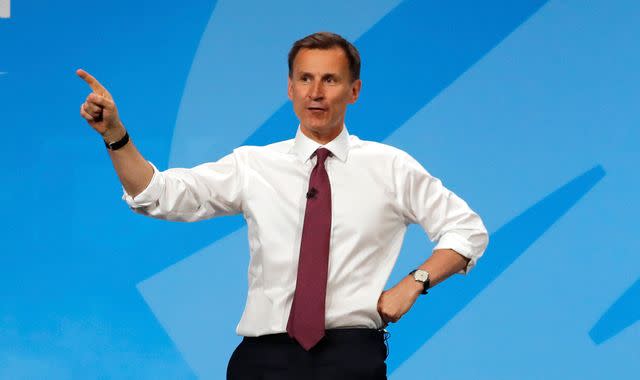Jeremy Hunt: Who is the UK's new chancellor?

Kwasi Kwarteng has been ousted as chancellor and will be replaced by former foreign secretary and Conservative leadership contender Jeremy Hunt.
The ascent of Mr Hunt, who backed Prime Minister Liz Truss's rival Rishi Sunak in the fight to become leader, is considered an attempt to restore stability after weeks of rough seas in the wake of the recent mini-budget.
Jeremy Hunt warns of 'tough decisions' - follow politics latest
Seen by many in the party as a safe pair of hands, Mr Hunt was previously the longest-serving health minister between 2012 and 2018 and was culture minister between 2010 and 2012 under former prime minister David Cameron. He also held the post of foreign secretary under Theresa May between 2018 and 2019.
Since Boris Johnson's ascent to Downing Street, he has been a backbench MP and the chair of the Commons health and social care select committee since 2020.
He has twice been unsuccessful in running for the Tory Party leadership, once losing to Mr Johnson and then being knocked out in the first round of voting in the contest which saw Ms Truss take up the mantle.
Mr Hunt being appointed chancellor signals a major shift in policy direction.
He is a more centrist figure than either Mr Kwarteng or Ms Truss and is unlikely to share their ideological free market commitment to tax cuts.
Brought up in the constituency where he has been an MP since 2005, Mr Hunt is the oldest son of Admiral Sir Nicholas Hunt.
He went to the private Charterhouse School where he was head boy before going on to study philosophy, politics and economics (PPE) at Magdalen College, Oxford University, graduating with a first.
During his time at Oxford, he began to dip his toes into politics with a stint as president of the university's Conservative Association.
Sold business for £14m
Before his political career began in earnest, he worked as an English teacher in Japan and then co-founded an educational publishing business.
He sold 'Hotcourses' in 2017, reportedly for £14million, which made him one of the richest politicians in the UK.
Before being elected MP for South West Surrey in 2005, he also set up a charity to help AIDS orphans in Africa, which he is still involved with today.
Three years after entering parliament, in opposition under Tony Blair before David Cameron's victory in 2010, he met his wife Lucia at an event for Hotcourses.
Born in China, she had a job at Warwick University recruiting Chinese students to study in the UK.
The couple were engaged and married the following year at a traditional ceremony in Xian.
Soon after he was made foreign secretary in 2018, on a visit to China, Mr Hunt famously got his wife's nationality wrong - referring to her as Japanese.
During that role, he championed the defence of media freedom around the world and the protection of Christians from persecution. He was criticised for allowing the UK to sell arms to Saudi Arabia during its controversial military campaign in Yemen.
His stint as culture secretary saw him work closely with then-Mayor of London Boris Johnson on the London 2012 Olympics and come under major fire for his role in the BskyB takeover bid.
He faced calls to resign over his contacts with Rupert Murdoch's empire while the bid was being considered.
Junior doctors strike over new contracts
Mr Hunt is most well known in recent years for his time as health secretary.
Overseeing a period of cuts and privatisation across the NHS, he was also responsible for a highly controversial new contract for junior doctors.
It prompted medics to strike for two days - leaving emergency care uncovered - for the first time in the health service's history.
Ultimately, a new contract was imposed.
He splits his time between homes in London and Godalming, Surrey, and has a son and two daughters.
His register of interests reveals he has a half-share of a holiday house in Italy and seven apartments in Southampton.
Since 2017 he has co-owned a real estate business - Mare Pond Properties Ltd - with his wife.
On several occasions over the past year he has been paid between £2,000 and £10,000 to speak at various organisations, but has donated all fees to charity.

 Yahoo News
Yahoo News 
